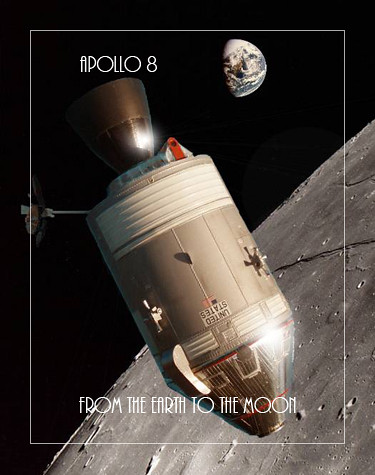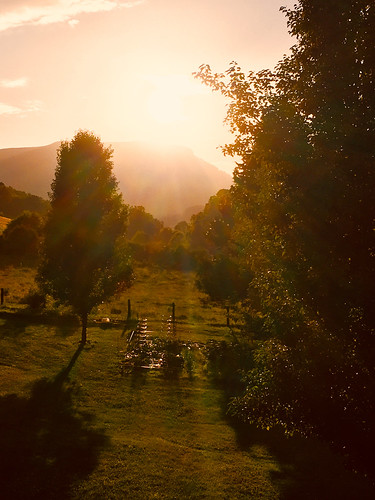
Volume XIV, Issue XXV
The Daring Adventure of Apollo 8
Those three men have carried into space all the resources of art, science, and industry. With that, one can do anything; and you will see that, some day, they will come out all right.” – Jules Verne
Imago Dei, the statement in Genesis that man is indeed created in the image of his Creator, is played out most clearly in the creative impulses and great accomplishments that humankind has risen too. In the Nineteenth Century, Jules Verne envisioned man ‘beating his swords’ not into ploughshares, but into a journey to another world. The Twentieth Century saw just that happen with the terrible weapons of destruction forged into the accomplishment of an actual journey to the moon. Orbiting the moon on Christmas Eve in 1968, the astronauts read the following:
William Anders
We are now approaching lunar sunrise, and for all the people back on Earth, the crew of Apollo 8 has a message that we would like to send to you.
In the beginning God created the heaven and the earth. And the earth was without form, and void; and darkness was upon the face of the deep.
And the Spirit of God moved upon the face of the waters. And God said, Let there be light: and there was light.
And God saw the light, that it was good: and God divided the light from the darkness.
James Lovell
And God called the light Day, and the darkness he called Night. And the evening and the morning were the first day.
And God said, Let there be a firmament in the midst of the waters, and let it divide the waters from the waters.
And God made the firmament, and divided the waters which were under the firmament from the waters which were above the firmament: and it was so.
And God called the firmament Heaven. And the evening and the morning were the second day.”
Frank Borman
And God said, Let the waters under the heaven be gathered together unto one place, and let the dry land appear: and it was so.
And God called the dry land Earth; and the gathering together of the waters called he Seas: and God saw that it was good.”
And from the crew of Apollo 8, we close with good night, good luck, a Merry Christmas – and God bless all of you, all of you on the good Earth. [1.]
From the Earth to the Moon
By Jules Verne
CHAPTER XXVI, FIRE!
The first of December had arrived! the fatal day! for, if the projectile were not discharged that very night at 10h. 48m. 40s. P.M., more than eighteen years must roll by before the moon would again present herself under the same conditions of zenith and perigee.
The weather was magnificent. Despite the approach of winter, the sun shone brightly, and bathed in its radiant light that earth which three of its denizens were about to abandon for a new world.
How many persons lost their rest on the night which preceded this long-expected day! All hearts beat with disquietude, save only the heart of Michel Ardan.
That imperturbable personage came and went with his habitual business-like air, while nothing whatever denoted that any unusual matter preoccupied his mind.
After dawn, an innumerable multitude covered the prairie which extends, as far as the eye can reach, round Stones Hill. Every quarter of an hour the railway brought fresh accessions of sightseers; and, according to the statement of the Tampa Town Observer, not less than five millions of spectators thronged the soil of Florida.
For a whole month previously, the mass of these persons had bivouacked round the enclosure, and laid the foundations for a town which was afterward called "Ardan's Town." The whole plain was covered with huts, cottages, and tents. Every nation under the sun was represented there; and every language might be heard spoken at the same time. It was a perfect Babel re-enacted. All the various classes of American society were mingled together in terms of absolute equality. Bankers, farmers, sailors, cotton-planters, brokers, merchants, watermen, magistrates, elbowed each other in the most free-and-easy way. Louisiana Creoles fraternized with farmers from Indiana; Kentucky and Tennessee gentlemen and haughty Virginians conversed with trappers and the half-savages of the lakes and butchers from Cincinnati. Broad-brimmed white hats and Panamas, blue-cotton trousers, light-colored stockings, cambric frills, were all here displayed; while upon shirt-fronts, wristbands, and neckties, upon every finger, even upon the very ears, they wore an assortment of rings, shirt-pins, brooches, and trinkets, of which the value only equaled the execrable taste. Women, children, and servants, in equally expensive dress, surrounded their husbands, fathers, or masters, who resembled the patriarchs of tribes in the midst of their immense households.
At meal-times all fell to work upon the dishes peculiar to the Southern States, and consumed with an appetite that threatened speedy exhaustion of the victualing powers of Florida, fricasseed frogs, stuffed monkey, fish chowder, underdone 'possum, and raccoon steaks. And as for the liquors which accompanied this indigestible repast! The shouts, the vociferations that resounded through the bars and taverns decorated with glasses, tankards, and bottles of marvelous shape, mortars for pounding sugar, and bundles of straws! "Mint-julep" roars one of the barmen; "Claret sangaree!" shouts another; "Cocktail!" "Brandy-smash!" "Real mint-julep in the new style!" All these cries intermingled produced a bewildering and deafening hubbub.
But on this day, 1st of December, such sounds were rare. No one thought of eating or drinking, and at four P.M. there were vast numbers of spectators who had not even taken their customary lunch! And, a still more significant fact, even the national passion for play seemed quelled for the time under the general excitement of the hour.
Up till nightfall, a dull, noiseless agitation, such as precedes great catastrophes, ran through the anxious multitude. An indescribable uneasiness pervaded all minds, an indefinable sensation which oppressed the heart. Every one wished it was over.
However, about seven o'clock, the heavy silence was dissipated. The moon rose above the horizon. Millions of hurrahs hailed her appearance. She was punctual to the rendezvous, and shouts of welcome greeted her on all sides, as her pale beams shone gracefully in the clear heavens. At this moment the three intrepid travelers appeared. This was the signal for renewed cries of still greater intensity. Instantly the vast assemblage, as with one accord, struck up the national hymn of the United States, and "Yankee Doodle," sung by five million of hearty throats, rose like a roaring tempest to the farthest limits of the atmosphere. Then a profound silence reigned throughout the crowd.
The Frenchman and the two Americans had by this time entered the enclosure reserved in the center of the multitude. They were accompanied by the members of the Gun Club, and by deputations sent from all the European Observatories.
Barbicane, cool and collected, was giving his final directions. Nicholl, with compressed lips, his arms crossed behind his back, walked with a firm and measured step. Michel Ardan, always easy, dressed in thorough traveler's costume, leathern gaiters on his legs, pouch by his side, in loose velvet suit, cigar in mouth, was full of inexhaustible gayety, laughing, joking, playing pranks with J. T. Maston. In one word, he was the thorough "Frenchman" (and worse, a "Parisian") to the last moment.
Ten o'clock struck! The moment had arrived for taking their places in the projectile! The necessary operations for the descent, and the subsequent removal of the cranes and scaffolding that inclined over the mouth of the Columbiad, required a certain period of time.
Barbicane had regulated his chronometer to the tenth part of a second by that of Murchison the engineer, who was charged with the duty of firing the gun by means of an electric spark. Thus the travelers enclosed within the projectile were enabled to follow with their eyes the impassive needle which marked the precise moment of their departure.
The moment had arrived for saying "good-by!" The scene was a touching one. Despite his feverish gayety, even Michel Ardan was touched. J. T. Maston had found in his own dry eyes one ancient tear, which he had doubtless reserved for the occasion. He dropped it on the forehead of his dear president.
Can I not go?" he said, "there is still time!"
Impossible, old fellow!" replied Barbicane. A few moments later, the three fellow-travelers had ensconced themselves in the projectile, and screwed down the plate which covered the entrance-aperture. The mouth of the Columbiad, now completely disencumbered, was open entirely to the sky.
The moon advanced upward in a heaven of the purest clearness, outshining in her passage the twinkling light of the stars. She passed over the constellation of the Twins, and was now nearing the halfway point between the horizon and the zenith. A terrible silence weighed upon the entire scene! Not a breath of wind upon the earth! not a sound of breathing from the countless chests of the spectators! Their hearts seemed afraid to beat! All eyes were fixed upon the yawning mouth of the Columbiad.
Murchison followed with his eye the hand of his chronometer. It wanted scarce forty seconds to the moment of departure, but each second seemed to last an age! At the twentieth there was a general shudder, as it occurred to the minds of that vast assemblage that the bold travelers shut up within the projectile were also counting those terrible seconds. Some few cries here and there escaped the crowd.
Thirty-five!-- thirty-six!-- thirty-seven!-- thirty-eight!-- thirty-nine!-- forty! FIRE!!!"
Instantly Murchison pressed with his finger the key of the electric battery, restored the current of the fluid, and discharged the spark into the breech of the Columbiad.
An appalling unearthly report followed instantly, such as can be compared to nothing whatever known, not even to the roar of thunder, or the blast of volcanic explosions! No words can convey the slightest idea of the terrific sound! An immense spout of fire shot up from the bowels of the earth as from a crater. The earth heaved up, and with great difficulty some few spectators obtained a momentary glimpse of the projectile victoriously cleaving the air in the midst of the fiery vapors!
CHAPTER XXVII, FOUL WEATHER
At the moment when that pyramid of fire rose to a prodigious height into the air, the glare of flame lit up the whole of Florida; and for a moment day superseded night over a considerable extent of the country. This immense canopy of fire was perceived at a distance of one hundred miles out at sea, and more than one ship's captain entered in his log the appearance of this gigantic meteor.
The discharge of the Columbiad was accompanied by a perfect earthquake. Florida was shaken to its very depths. The gases of the powder, expanded by heat, forced back the atmospheric strata with tremendous violence, and this artificial hurricane rushed like a water-spout through the air.
Not a single spectator remained on his feet! Men, women children, all lay prostrate like ears of corn under a tempest. There ensued a terrible tumult; a large number of persons were seriously injured. J. T. Maston, who, despite all dictates of prudence, had kept in advance of the mass, was pitched back 120 feet, shooting like a projectile over the heads of his fellow-citizens. Three hundred thousand persons remained deaf for a time, and as though struck stupefied.
As soon as the first effects were over, the injured, the deaf, and lastly, the crowd in general, woke up with frenzied cries. "Hurrah for Ardan! Hurrah for Barbicane! Hurrah for Nicholl!" rose to the skies. Thousands of persons, noses in air, armed with telescopes and race-glasses, were questioning space, forgetting all contusions and emotions in the one idea of watching for the projectile. They looked in vain! It was no longer to be seen, and they were obliged to wait for telegrams from Long's Peak. The director of the Cambridge Observatory was at his post on the Rocky Mountains; and to him, as a skillful and persevering astronomer, all observations had been confided.
But an unforeseen phenomenon came in to subject the public impatience to a severe trial.
The weather, hitherto so fine, suddenly changed; the sky became heavy with clouds. It could not have been otherwise after the terrible derangement of the atmospheric strata, and the dispersion of the enormous quantity of vapor arising from the combustion of 200,000 pounds of pyroxyle!
On the morrow the horizon was covered with clouds-- a thick and impenetrable curtain between earth and sky, which unhappily extended as far as the Rocky Mountains. It was a fatality! But since man had chosen so to disturb the atmosphere, he was bound to accept the consequences of his experiment.
Supposing, now, that the experiment had succeeded, the travelers having started on the 1st of December, at 10h. 46m. 40s. P.M., were due on the 4th at 0h. P.M. at their destination. So that up to that time it would have been very difficult after all to have observed, under such conditions, a body so small as the shell. Therefore they waited with what patience they might.
From the 4th to the 6th of December inclusive, the weather remaining much the same in America, the great European instruments of Herschel, Rosse, and Foucault, were constantly directed toward the moon, for the weather was then magnificent; but the comparative weakness of their glasses prevented any trustworthy observations being made.
On the 7th the sky seemed to lighten. They were in hopes now, but their hope was of but short duration, and at night again thick clouds hid the starry vault from all eyes.
Matters were now becoming serious, when on the 9th the sun reappeared for an instant, as if for the purpose of teasing the Americans. It was received with hisses; and wounded, no doubt, by such a reception, showed itself very sparing of its rays.
On the 10th, no change! J. T. Maston went nearly mad, and great fears were entertained regarding the brain of this worthy individual, which had hitherto been so well preserved within his gutta-percha cranium.
But on the 11th one of those inexplicable tempests peculiar to those intertropical regions was let loose in the atmosphere. A terrific east wind swept away the groups of clouds which had been so long gathering, and at night the semi-disc of the orb of night rode majestically amid the soft constellations of the sky.
CHAPTER XXVIII, A NEW STAR
That very night, the startling news so impatiently awaited, burst like a thunderbolt over the United States of the Union, and thence, darting across the ocean, ran through all the telegraphic wires of the globe. The projectile had been detected, thanks to the gigantic reflector of Long's Peak! Here is the note received by the director of the Observatory of Cambridge. It contains the scientific conclusion regarding this great experiment of the Gun Club.
LONG'S PEAK, December 12. To the Officers of the Observatory of Cambridge. The projectile discharged by the Columbiad at Stones Hill has been detected by Messrs. Belfast and J. T. Maston, 12th of December, at 8:47 P.M., the moon having entered her last quarter. This projectile has not arrived at its destination. It has passed by the side; but sufficiently near to be retained by the lunar attraction.
The rectilinear movement has thus become changed into a circular motion of extreme velocity, and it is now pursuing an elliptical orbit round the moon, of which it has become a true satellite.
The elements of this new star we have as yet been unable to determine; we do not yet know the velocity of its passage. The distance which separates it from the surface of the moon may be estimated at about 2,833 miles.
However, two hypotheses come here into our consideration.
1. Either the attraction of the moon will end by drawing them into itself, and the travelers will attain their destination; or,
2. The projectile, following an immutable law, will continue to gravitate round the moon till the end of time.
At some future time, our observations will be able to determine this point, but till then the experiment of the Gun Club can have no other result than to have provided our solar system with a new star. J. BELFAST.
To how many questions did this unexpected denouement give rise? What mysterious results was the future reserving for the investigation of science? At all events, the names of Nicholl, Barbicane, and Michel Ardan were certain to be immortalized in the annals of astronomy!
When the dispatch from Long's Peak had once become known, there was but one universal feeling of surprise and alarm. Was it possible to go to the aid of these bold travelers? No! for they had placed themselves beyond the pale of humanity, by crossing the limits imposed by the Creator on his earthly creatures. They had air enough for two months; they had victuals enough for twelve;-- but after that? There was only one man who would not admit that the situation was desperate-- he alone had confidence; and that was their devoted friend J. T. Maston.
Besides, he never let them get out of sight. His home was henceforth the post at Long's Peak; his horizon, the mirror of that immense reflector. As soon as the moon rose above the horizon, he immediately caught her in the field of the telescope; he never let her go for an instant out of his sight, and followed her assiduously in her course through the stellar spaces. He watched with untiring patience the passage of the projectile across her silvery disc, and really the worthy man remained in perpetual communication with his three friends, whom he did not despair of seeing again some day.
Those three men," said he, "have carried into space all the resources of art, science, and industry. With that, one can do anything; and you will see that, some day, they will come out all right."
(to be continued)
The Wizard and the Prophet
Futurists and What Drives Them
Harari sketches a dystopian future in the hopes that doing so will prevent it. Like all prophets, he prophesies to prevent the prophecy, not to predict it.” –John Faithful Hamer
I found this quote in a book review and I have to agree that the Prophets of old put forth their dystopian vision in Scripture not desiring to see it, but in the hopes that it would be averted. Indeed Jeremiah 29;11 makes the mind of the Divine clear: “For I know the thoughts that I think toward you, saith the LORD, thoughts of peace, and not of evil, to give you an expected end.” That is how I read the prophets of old – that is how I read a lot of modern ‘dystopian’ fiction. Those of you who have followed THYME for a while know how when a family member handed me a novel about a series of ‘revelations’ surrounding 9/11 I took it in just that way. Unfortunately the author was appearing on the Jim Bakker Show hawking overpriced ‘survival buckets.’ When coupled with the ‘Blood Moon’ videos by John Hagee, we’re no longer trying to lead humanity away from disaster, we’re proclaiming it. And we’re bringing in profit to boot.
Never mind that the prophets of old did NOT make big bucks or go on book tours. Never mind that they were persecuted and sometimes lost their lives – I like to think that the true mission of the writer is to both lead us away from disaster and to lead us toward a brighter future. Jules Verne indeed envisioned a marvelous world of modern machines but he also was an astute observer of human nature. Consider characters like Captain Nemo. Consider as well his unpublished work: Paris in the Twentieth Century. Verne’s publisher rejected it as too dark – too dystopian. I think Verne is a great example of how to ponder both the wonder of the future and the dangers. That he tried to do both makes him great in my mind.

Untitled Painting by Savhanna Herndon.
Wizards and Prophets
By John Faithful Hamer
[click to read]
In The Wizard and the Prophet (2018), Charles C. Mann maintains that intellectual life in the 21st century is defined by a civil war between Wizards, who believe that technology will save us, and Prophets, who see various kinds of disaster on the horizon: “Prophets look at the world as finite, and people as constrained by their environment. Wizards see possibilities as inexhaustible, and humans as wily managers of the planet. One views growth and development as the lot and blessing of our species; others regard stability and preservation as our future and our goal. Wizards regard Earth as a toolbox, its contents freely available for use; Prophets think of the natural world as embodying an overarching order that should not casually be disturbed.” Steven Pinker, the author of Enlightenment Now: The Case for Reason, Science, Humanism, and Progress (2018), is a Wizard. Yuval Noah Harari, the author of Homo Deus: A Brief History of Tomorrow (2015), is a Prophet. (read more)

Bee and Rhododendron. Photo by Bob Kirchman.
Message in Our Missives
Christian Creatives in a Fallen World
[click to read]
Hi, I'm Lela Markham and this is my inaugural post on Delia Talent. I write speculative fiction, primarily, while delving into other genres on occasion. I'm one of those Christian creatives who does not advertise my works as "Christian". Historically, Christian creatives didn't claim a territory and label themselves. We don't think of Bach as a "Christian" musician, but rather a great composer who made his living as a church organist. Unless you're a history geek like me, you might not know about his deep and abiding faith. Although we now think of C. S. Lewis as a "Christian" author, his fictional works weren't advised as such when he was publishing because Christians of that era hadn't decided to paint themselves into a box with a label. Back when I was a kid Elvis Presley (not an example of a "good" Christian, but a man with a church background) and Johnny Cash (by that time, a reprobate saved by Christ) were singing gospel tunes right along with their secular tunes on regular radio ... and my non-believing parents didn't find that the least bit odd. (read more)

Hari and Penka Atanasov. Advancing Native Missions Photo.
In Search of the Light
Hari and Penka Atanasov
By Dee Brookshire
[click to read]
The canvas was called “Morning in Gethsemane.” After a night of agony, Jesus’ surrender to the Father’s will was illuminated by a light extending from heaven to earth. A Turkish lady from the Bulgarian parliament approached Hari and Penka Atanasov to express how this painting had touched her life. (read more)

Sunset over House Mountain. Photo by Bob Kirchman.
On Calling and IMAGO DEI
Discerning the Strokes of the Master
O Master Maker! Thy exultant art
Goes forth in making makers.”
—George MacDonald
If George MacDonald is correct in asserting that all wickedness tends to destroy individuality, then the Christian should have more individuality than anyone else. Purged of the encumbering weight of the wicked self and knighted by the accolade of the All-Sufficient, he should demonstrate daily the abundance that is repeatedly declared to be in Christ. Macdonald says of the white stone with the new name in the Book of Revelation that it is given because it expresses “the character, the nature, the meaning of the person who bears it. It is the man’s own symbol—his soul’s picture, in a word—the sign which belongs to him and no one else.” The great Creator Artist wants to render not only a Christian in His image but at the same time produce a portrait of the real qua man (for it is man and not the angels who are saves) relieved of the debilitation and devilish self.
Among devoted young Christians seeking the fullest possible service of God, the personality is frequently weighed in precisely the wrong manner, or perhaps we should say ignored. Urged to “empty the self” and submit to God’s consuming fire their most prized possession, they sometimes tragically withdraw from the very talent that God has uniquely given. This in part accounts for the number of failures in Christian service. It is as if a man with obvious talents—let us say in bridge building—should convince himself that bridge building is the one thing not to undertake but rather that he must become a poet. Christian young people ask with a soul-stirring devotion to God, what shall I do with my life? And are told in effect to become a missionary, become a minister, or become a Christian businessman or housewife. What a tragic dearth of imagination. Not, of course, that there is not room for a great variety in these categories, but that the method itself is constrictive.
One suggestion is that we spend less time telling young Christians and more inquiring of them with a view of entering, and having them honestly enter, the crepuscular (dim) world of their motives and talents. Then we need to remind young people often that patterning their life after another—a common practice in all men—has some advantages and other decided disadvantages. I had the privilege of talking with Grandma Moses, the primitive painter, and she told me her agents disliked for her to go down to New York City and particularly for her to go to art galleries. They were afraid she would lose the delightful naiveté which makes up her native genius. Young people should be similarly cautioned to look for God-given uniqueness in themselves and when discovered (and I feel there is much more of it than now appears) warned to guard and cherish it.”
—Clyde S. Kilby, Arts and the Christian Imagination
